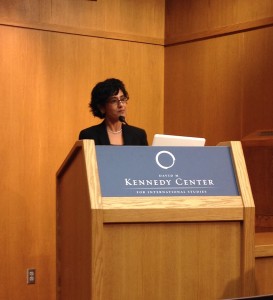
Somini Sengupta, the United Nations bureau chief for The New York Times, spoke to BYU students on Thursday about the challenges the U.N. is currently facing in today’s crisis-ridden world.
Sengupta, who said she covers stories about diplomats and warlords alike, gave students a brief understanding of how the U.N. makes decisions and then focused on four international issues that are keeping the U.N. busy: Syria, Ukraine, ISIS and Ebola. She gave a balanced view of the U.N., both critiquing and praising its effectiveness in dealing with these issues.
The U.N. Security Council is made up of five permanent members and 10 rotating non-permanent members. The permanent members are the U.S., Great Britain, France, Russia and China. Each of these members has the ability to veto any vote the security council makes if they feel that their interests are threatened. Unfortunately this results in the U.N. remaining aloof from many large conflicts due to the veto of one of these permanent members.
Sengupta quoted one French diplomat as saying, “That leaves the U.N. in charge of crises that matter to nobody,” referring to the fact that the U.N is better at solving problems that don’t come into contact with the interests of the “big five.”
“Syria marks a new level of dysfunction on the U.N. security council,” Sengupta said, speaking of the ongoing civil war in Syria. “There is compelling evidence of crimes against humanity on both sides, and still the world powers have been totally unable to stop the war.”
She went on to explain that because Russia has a good relationship with Bashar al-Assad, the current leader in Syria, it has vetoed many of the attempts the U.N. has made to get involved in the conflict. Al-Assad, who is accused of using starvation as a tactic of war, has refused to let the U.N. send food and supplies to areas held by the Syrian opposition.
ISIS, also known as ISIL, was another topic Sengupta spoke on. After taking over much of Iraq, the organization is accused of beheading multiple journalists and requiring religious minorities to choose between converting to Islam and being killed.
“ISIS is truly a new kind of threat,” Sengupta said. “It’s a transnational organization; it’s brutal, and it’s able to use technology to spread its message.”
One of the ways the U.N. has gotten involved is through attempts to stop ISIS from recruiting. According to Sengupta, ISIS has been successful in recruiting men and women from 80 different countries. The U.N. security council passed a legally binding resolution in September, demanding every country around the world take steps to stop the flow of fighters.
Unfortunately, as in Syria, the security council has been powerless to stop the rise and spread of ISIS, despite warning the world of a pending massacre earlier this month.
Despite mentioning multiple failures, Sengupta also defended the U.N. multiple times.
“The U.N. has a whole lot of tentacles doing a whole lot of things in the world,” Sengupta explained. “(Building) schools in Gaza, stopping wars, curbing emissions, feeding people. Last year the world food program fed 80 million people.”
She concluded with one scholar’s view that we may actually be living in the most peaceful, prosperous time of the human species, quoting a study that shows deadly conflicts have declined by half since the end of the Cold War. This would imply the U.N., despite its many weaknesses, may be having a positive effect.
“The past seems less innocent, the present less sinister, and as I remind myself when I walk my kid to school, the future seems less of a thing to fear,” Sengupta said.




